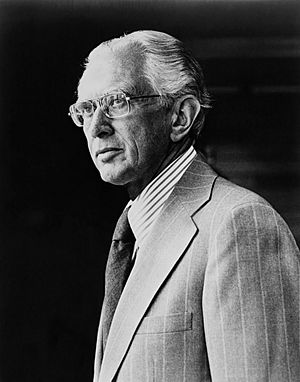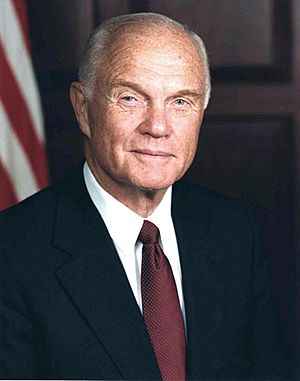Howard Metzenbaum facts for kids
Quick facts for kids
Howard Metzenbaum
|
|
|---|---|

Metzenbaum in 1983
|
|
| United States Senator from Ohio |
|
| In office December 29, 1976 – January 3, 1995 |
|
| Preceded by | Robert Taft Jr. |
| Succeeded by | Mike DeWine |
| In office January 4, 1974 – December 23, 1974 |
|
| Appointed by | John J. Gilligan |
| Preceded by | William B. Saxbe |
| Succeeded by | John Glenn |
| Member of the Ohio Senate | |
| In office 1947–1951 |
|
| Member of the Ohio House of Representatives | |
| In office 1943–1947 |
|
| Personal details | |
| Born |
Howard Morton Metzenbaum
June 4, 1917 Cleveland, Ohio, U.S. |
| Died | March 12, 2008 (aged 90) Aventura, Florida, U.S. |
| Resting place | Mayfield Cemetery |
| Political party | Democratic |
| Spouse |
Shirley Turoff
(m. 1947) |
| Children | 4, including Shelley |
| Alma mater | Ohio State University (BA, LLB) |
Howard Morton Metzenbaum (June 4, 1917 – March 12, 2008) was an American politician and a successful businessman. He was a member of the Democratic Party. Metzenbaum served as a U.S. Senator for Ohio for nearly 20 years, from 1974 to 1995. Before that, he was also a member of the Ohio House of Representatives and the Ohio Senate from 1943 to 1951.
Contents
Howard Metzenbaum's Early Life and Education
Howard Metzenbaum was born on June 4, 1917, in Cleveland, Ohio. His family was not wealthy. His grandparents came to the United States from Poland, France, and Hungary. They were Jewish.
Howard went to Glenville High School. He was active in track and worked many part-time jobs to help his family. He then attended Ohio State University. He earned a bachelor's degree in 1939 and a law degree in 1941.
After college, he became a lawyer in Cleveland. At first, he faced challenges because he was Jewish. However, he found success representing large labor unions. These groups helped workers get fair pay and good working conditions. He worked with unions like the Communications Workers of America.
Howard Metzenbaum's Business Ventures
Howard Metzenbaum became very rich through smart investments. He especially focused on real estate. He and his business partner, Alva "Ted" Bonda, bought land near what is now the Cleveland Hopkins International Airport. They believed this land would be perfect for profitable, 24-hour parking lots.
Their business grew into the Airport Parking Company of America (APCOA). This company became the largest parking lot company in the world. By 1970, Metzenbaum sold his share of APCOA Parking for a lot of money, about $20 million.
In the early 1970s, Metzenbaum also owned part of the Sun Newspapers. This was a group of weekly newspapers that covered the suburbs around Cleveland.
Howard Metzenbaum's Political Journey
Howard Metzenbaum had a long career in politics. He started in Ohio's state government before moving to the U.S. Senate.
Serving in the Ohio Legislature
Metzenbaum first served in the Ohio House of Representatives from 1943 to 1947. After that, he was a member of the Ohio Senate from 1947 to 1951.
In 1958, he helped manage the campaign for Stephen M. Young. Young surprisingly won a U.S. Senate seat. Metzenbaum also helped Young win reelection in 1964.
Becoming a U.S. Senator
In 1970, Metzenbaum ran for a U.S. Senate seat. He won the Democratic primary election against astronaut John Glenn. However, he lost the main election to Robert Taft Jr.
In 1974, Senator William B. Saxbe left his seat. Ohio's Governor, John J. Gilligan, chose Metzenbaum to fill the rest of Saxbe's term. Metzenbaum then ran to keep the seat. But in a tough primary election, he lost to John Glenn.
During that election, Metzenbaum suggested that Glenn, who was a famous astronaut, had "never worked for a living." Glenn responded with a powerful speech. He said Metzenbaum should tell injured veterans or mothers who lost sons in war that their loved ones "did not hold a job." Many people felt this speech helped Glenn win the primary.
In 1976, Metzenbaum ran for the Senate again, this time against Robert Taft Jr. He won this close race. He was sworn in a few days early, which gave him a small advantage in seniority over other new senators. He was reelected easily in 1982.
In 1981, another senator, Ernest Hollings, made a comment that some people thought was disrespectful to Metzenbaum's Jewish faith. Hollings later apologized, and his remarks were removed from the official record.
Metzenbaum was known for being a strong liberal voice in the Senate. He was sometimes called "Senator No" because he often blocked bills he disagreed with. He would do this by offering many amendments or by using a filibuster. A filibuster is when a senator gives a very long speech to delay or prevent a vote on a bill.
He was very interested in protecting consumers and making sure businesses competed fairly. He often spoke about changing the special rules that allowed Major League Baseball to be exempt from certain antitrust laws.
Metzenbaum also raised concerns about aspartame, an artificial sweetener. He questioned whether the company making it had provided accurate information to the Food and Drug Administration (FDA). He wanted products with aspartame to be clearly labeled.
Cleveland Stokers Soccer Team
In 1968, Metzenbaum and his partner, Ted Bonda, bought the Cleveland Stokers soccer club. The team played for one year in the North American Soccer League. They even won their division. However, Metzenbaum and Bonda decided to leave the league because they had different ideas about how to run the business compared to the other team owners.
Life After the Senate
Howard Metzenbaum decided not to run for reelection in 1994. After leaving the Senate in 1995, he became the chairman of the Consumer Federation of America. This group works to protect the rights of consumers.
He passed away at his home in Aventura, Florida, on March 12, 2008. He was buried in Mayfield Cemetery in Cleveland Heights, Ohio.
There were rumors that Metzenbaum was connected to the Communist Party, but he always denied this. In 1987, a Republican group suggested he had "Communist sympathies," but their chairman later apologized for the false claim.
Howard Metzenbaum's Family Life
Howard Metzenbaum married Shirley Louise Turoff on August 8, 1946. They had four daughters: Barbara, Susan, Shelley, and Amy. One of his daughters, Susan, married Joel Hyatt.
Howard Metzenbaum's Legacy
Howard Metzenbaum helped create several important laws during his time as a senator. These include:
- The Worker Adjustment and Retraining Notification Act: This law requires companies to give workers advance warning before large factory closures.
- The Brady Law: This law set up a waiting period for buying handguns.
- The Howard M. Metzenbaum Multiethnic Placement Act of 1994 (MEPA): This law stops adoption agencies that receive federal money from delaying or denying child placement based on a child's race or ethnicity.
To honor his work, the Old Federal Building and Post Office in downtown Cleveland was renamed the Howard M. Metzenbaum United States Courthouse on May 27, 1998.
See also
- List of Jewish members of the United States Congress
 | Laphonza Butler |
 | Daisy Bates |
 | Elizabeth Piper Ensley |


